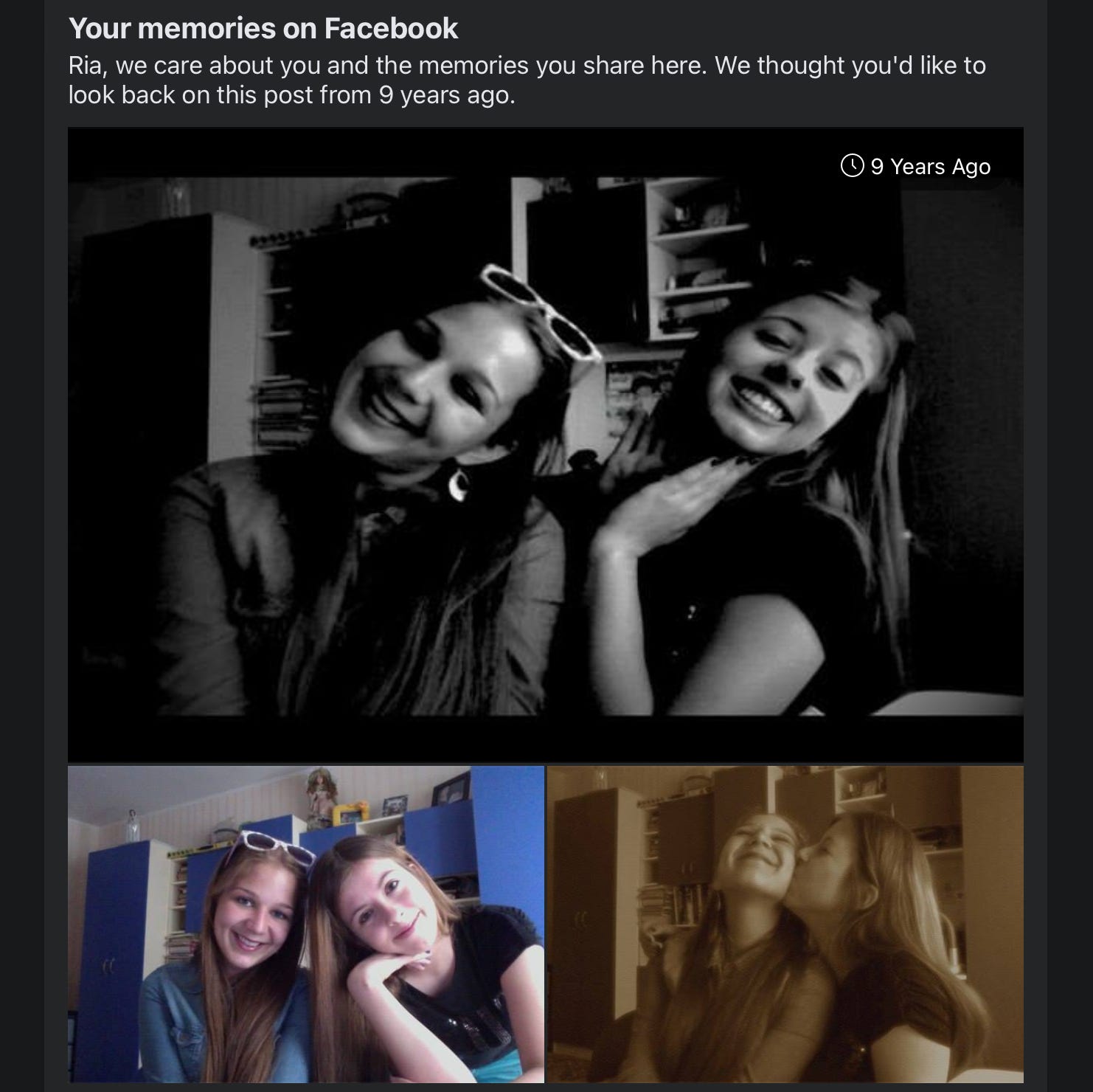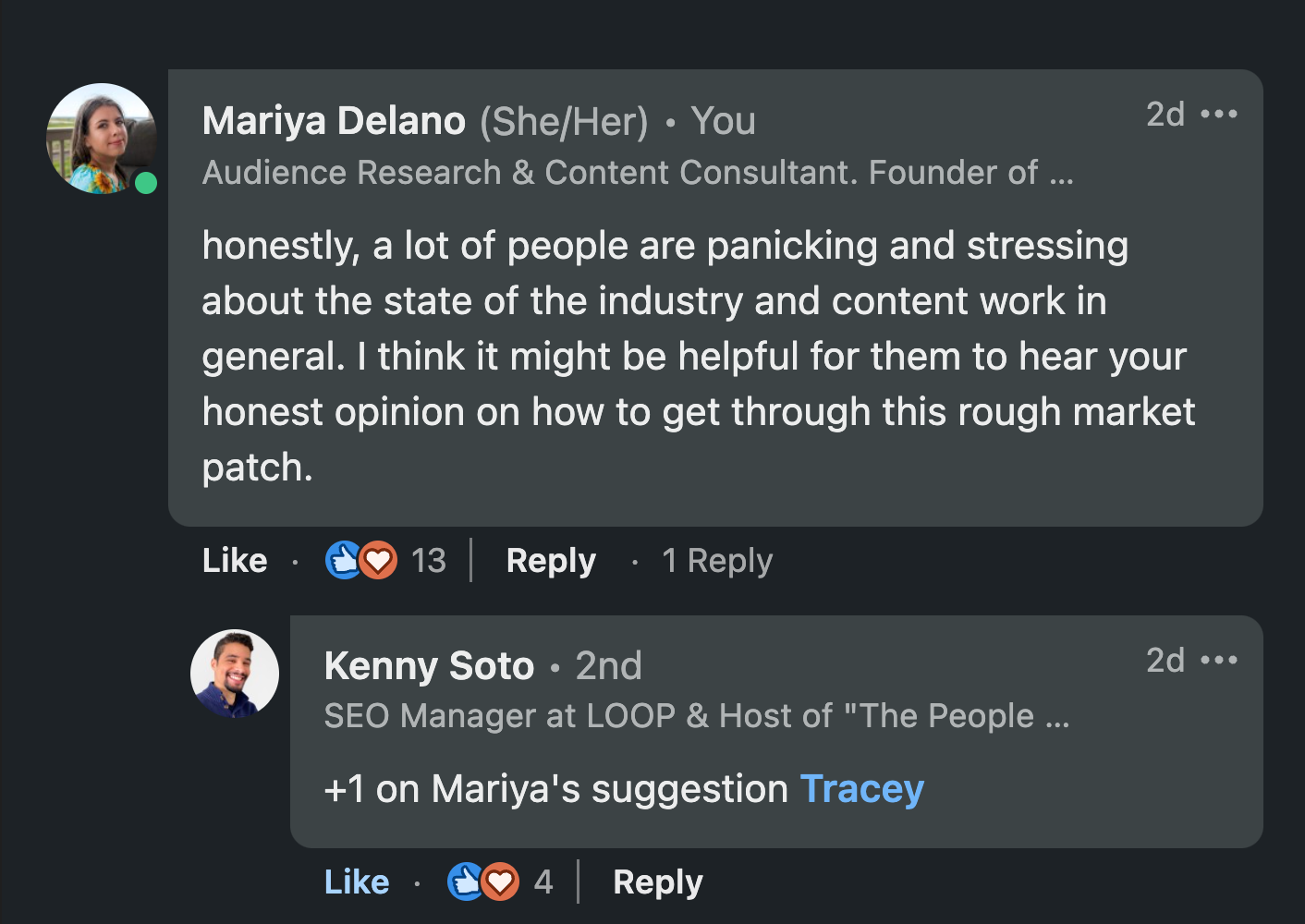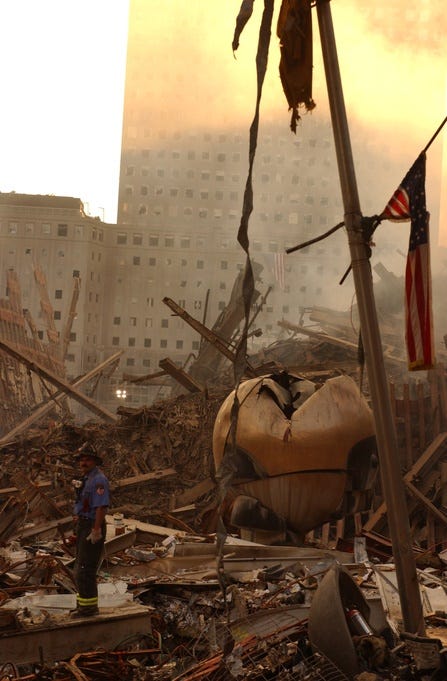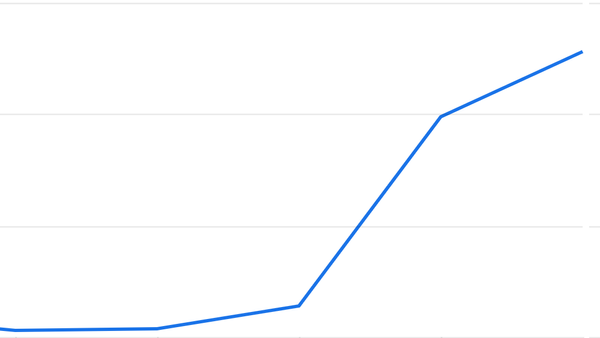Marketing at the End of the World
The world is ending. Does marketing even matter anymore?

As marketers, we are in the business of maintaining appearances. Whether we are public-facing figures ourselves or working behind the scenes for other creators and brands, we tend to put up the facade of constantly cheerful, professional, “sellable” existence.
But here’s a problem: how can you maintain a happy face when most of your past, even the joyful memories, are tainted by horror and loss?
I’m not trying to be hyperbolic. As a Ukrainian, being reminded of tragedy in the most mundane details is simply my everyday reality. For example, I just opened Facebook to this set of photos that I posted 9 years ago:

What could be upsetting about that post? Those photos show two teenage girls, happy to be reunited over summer break, having fun in Mac’s Photo Booth app.
Except, those are photos that I took with my childhood best friend in my family’s apartment in Zhytomyr, Ukraine.
My friend is currently in Poland, having fled from the war but trying to stay close to the border and her loved ones who aren’t able to leave. My family’s apartment, with those same blue shelves, is left abandoned. All of us have left the country with no return plans, besides the impossible hope that if we can safely come back… those shelves will still be standing, filled with the books that my family collected there for four generations, across more than half a century.
Today, I return to this newsletter to talk to you about the question we’re all avoiding, despite thinking about it all the time: how can we continue to do our marketing work when the entire world is ending around us?
TRIGGER WARNING: Discussions of death, war, destruction, loss, discrimination, mental health, personal tragedy, apocalypse, violence, nuclear weapons, suffering, terrorism, and the worst disaster of all: Twitter.
Face It. The World is Ending
I can’t deny it. It feels like the world is ending from every possible direction.
As I return to writing this newsletter after a concussion-induced hiatus, I am certain that this is the only topic I could possibly write about.
Because whether you are vocal about it or not, I’m confident that you feel like your world is ending too. And neither of us benefits from putting on a fake smile and keeping on as if we aren’t dealing with deep, existential, debilitating fear.
Even as I’ve tried to ignore that fear and keep talking about conversion rates, content quality, and audience research… the apocalypse kept knocking on the door of my consciousness. It continued to chase me from every website I visited and every direction I tried to run to.
A Brief List Of Recent Apocalyptic Events
- My native Ukraine is dealing with unimaginable tragedy and long-term ecological disaster, as the Kakhovka Dam in Kherson was blown up by Russia.
- Olena Bomko, a wonderful marketer who I follow on LinkedIn, took a break from talking about her work to tell us that because of that flood, her house in Kherson no longer exists.
- New York City, where my husband and I will be moving at the end of the summer, has looked like the set of a dystopian movie while covered in smoke coming from wildfires in Canada caused by climate change.
- Meanwhile, Shell has decided that profits are more important than sticking to reduced oil production targets.
- All around the world, including the United States (where I live), queer people, trans people, women, and far too many others are being actively denied humanity and bodily autonomy by hostile, cruel legislation. And yet, so many professional conferences are still being hosted in those places.
- AI is being used by giant corporations to try to distract us from both immediate harms caused by this technology, and other pressing threats to humanity & our wellbeing.
- Marketing jobs, especially in tech and SaaS (where I work), have become more scarce and unstable.
- Twitter, which I used to love, continues disintegrating into a confusing hell-hole of fascism and spam.
- Donald Trump has been charged with serious crimes, yet his supporters continue to call for violent upheaval of American democracy.
- Reddit, which is another site that I absolutely loved for work and personal reasons, is currently self-destructing as their leadership is refusing to listen to users and moderators.
- As I began writing this piece today, a news headline popped up that Russia delivered nuclear missiles to Belarus.
All of this doesn’t even account for the apocalyptic undertones in my current reality that aren’t making news headlines.
For example, I’m currently sitting not too far away from what used to be the Rocky Flats Plant, a manufacturing plant for nuclear weapons in the Denver area. We drive past a reminder of that dark history nearly every day, in the shape of a pretty fun horse statue wearing a Hazmat suit that’s known as the “Cold War Horse”.

And my personal life is in the middle of an apocalypse of its own: my husband graduated from law school, and we have moved out of our home in Ithaca, forever. We are currently wandering around the country staying with family and friends, waiting to feel “ready” to move to New York City for the foreseeable future. Those events are mundane, sure. But every move (especially between cities) is the ending of one world and the slow, agonizing transition to a new one.
But… Can’t We Just Get Back to Work?
Whatever your life circumstances, location, or political beliefs might be… if you live in 2023, then apocalyptic thoughts are inescapable. We are fooling ourselves if we think that personal and world tragedies won’t affect our work.
In case you don’t believe me, let me make the case with some more marketing-centric examples.
Tracey Wallace, Director of Content at Klaviyo, posted on LinkedIn that she is temporarily returning from maternal leave to write a few newsletters. My suggestion for a potential topic got 13 reactions and a comment supporting the idea:

Over on Superpath, I’ve been following a thread where someone asked how they can keep getting clients when work feels like it’s all dried up. This mirrors many conversations that I’ve had in the past couple of months with other agency owners, freelance consultants, in-house marketers, founders, and clients. Our industry is struggling. Many people have been laid off. Others, like me, are fighting tooth and nail to get enough work to keep our businesses going.
My first marketing conference, SaaS Open, was hosted in Manhattan, right next to the World Trade Center. As I ran to the venue that morning, late to the opening talk… I stopped right before the tunnel that would take me into Brookfield Place and the conference venue. I stopped to look at The Sphere that’s displayed in Liberty Park. This sphere.

Why was that sphere worth stopping for on one of the greatest days of my professional life so far? Why did I choose to take in the dissonance between the buzz of my professional conference and this physical reminder of the tragedy that was 9/11?
Because I think it’s important to remember pain when I’m happy.
As I wrote recently on my personal blog:
“to me, the existence of beauty in a place that was, at some point in the past, the center of suffering… that’s the most hopeful fact of them all.
A war zone can become a playground. A bomb shelter can turn into a library. A destroyed building might be transformed into a park. A corpse could fertilize the soil for a strong tree. And a broken child, shaking in fear, can become the love of someone’s life.
I have to remember suffering when I’m happy. Because if I forget… then I’ll have nothing to hold on to when the world falls apart again.”
Repressing Our Darkness Will Harm Our Work
If we repress these difficult realities of our work and refuse to acknowledge them, our work WILL suffer. Just because you’ve distracted yourself for a minute, an hour, a day, or even a whole month… all of those scary shadows haunting your subconscious will not disappear. They are simply waiting for the right moment to strike. And then, just as you’re in the middle of finishing up a deliverable hours before the deadline – you’ll see a LinkedIn post, an email, or a news headline that destroys you.
I believe that facing our personal and psychological demons is essential to doing good work. And I’m not the only one! Here’s what Rand Fishkin (who I somehow end up quoting in every single piece I make), wrote in his book “Lost and Founder”:
“It’s hard to make logical connections between these personal, emotional experiences and the output or quality of work at the company. Could it really be true that sharing stories of brain tumors and gender transitions, or accepting our children's sexuality, impacts the value our software delivers or the success of our marketing? Or that discomfort in sharing personal conflict or fear of retribution for speaking up about harassment could have negative impacts on those same outcomes? According to both the research and the anecdotal experiences, yes.”
And if we repress any of those uncomfortable emotions weighing us down, we will cause ourselves more pain. Rand found this out the hard way, when he went into work at his old company after his wife Geraldine was diagnosed with a brain tumor:
“The discomfort of having to pretend that everything was normal drove me mad. I kept up the facade for about two hours. After lunch, I called an impromptu all-hands meeting in the lobby, at the time the only space big enough (just barely) to hold us all.
I didn't say much. I could barely make it through a few short sentences. I just told everyone that the prior week, Geraldine had been diagnosed with a brain tumor and that we'd find out more soon, and that until we did, I was going to be a wreck. I told them I needed their help to make it through, and Moz did, too.””
Thankfully, Geraldine has recovered. But back then, they didn’t know if she would be. And pretending like they did… that would have slowly destroyed him. If any of you reading this were fans of Rand’s old content back in his Moz days, think about it this way: do you really think that he could have effectively taught you marketing while this secret was eating him alive?
Marketing work is not separate from the rest of the world. Marketing work is not separate from personal tragedies. Marketing work is not separate from our worlds, personal or otherwise, collapsing around our computer screens as we chase traffic boosts or increases in CTR. Even if you’re hiding in a bomb shelter, that won’t stop the bombs from falling on the ground above your head.
Finding Hope at the End of the World
Now that I have sufficiently depressed you, I’d like us to try and figure out how we can get through this crappy, crappy time.
Yes, the world is kind of terrible. Yes, our industry, our jobs, our countries, our climate, and our lives are all dealing with a never-ending barrage of “unprecedented” (and very much precedented) dangers. It sucks. It’s depressing. It’s terrifying.
But none of these terrible things mean that we should give up.
I’ve been looking for hope in a couple of places that I’ll share with you right now. If I do my job correctly, maybe you will resonate with them too.
The Man Who Made My Writing Career
My entire marketing career is built on a foundation of seeds that were planted by a single man.
Ken Nielsen was a professor at NYU Abu Dhabi, where I went to school. He taught classes in the theater department, in the freshman writing program, and he led our university’s Writing Center.
I spent a lot of time with Ken during my college years. I took his writing class in my freshman spring, where I was finally shown that I actually did have room to improve my writing ability (I was a little cocky back then). I worked in the writing center for the remaining three years of my degree. And I would regularly spend time in his office and the nearby library café, talking to Ken about everything under the sun.
Ken was the person who taught me to write the way I do. Ken was the person who taught me to think critically about everything I read and research. Ken was the person who nurtured my aptitude for teaching and asking questions. And Ken was the person who I ran to when I decided to change my major from physics to literature.
I will never forget running into his office that day, tears either already running down my face or welling up in my eyes. I sat down across him, in that small room covered from end-to-end in books and scribbled up papers, and asking him the most desperate question on my mind: “am I making a mistake by switching to writing, when it seems like the world doesn’t care about it anymore?”
Ken was the person who made me believe, with my entire heart, that writing and reading are important. That regardless of what path I might take after graduation, regardless of what I studied, regardless of where I decided to work… writing would continue to be important. Ken taught me that even when every economic force seems to knock down the importance of wrestling with difficult ideas, looking through dense texts, and then sitting to write out one’s thoughts – those activities continue to be some of the most significant work that humans can do.
Ken died last summer, on June 19, 2022. He passed unexpectedly for most of the students who knew him. He was still young, but according to his obituary, he died after “a period of illness”.
I didn’t get a chance to say goodbye. I didn’t get a chance to speak with him after graduating. I didn’t get a chance to tell him that I remembered nearly every conversation we ever had, and that my entire professional life has been an attempt to keep living out the values and skills that he instilled in me.
I cry whenever anybody mentions his name. Even now, nearly a year later, I’ve had to write this newsletter with a box of tissues by my side. Whenever any of my writing does well, my heart shatters into a thousand pieces, thinking that I will never be able to share those successes with him.
But I haven’t been able to stop thinking of Ken for the last couple of months because one of the books he introduced me to is the reason I continue to believe that my work is worth doing.
Writing at the End of the World
Months before I decided to change majors, Ken lent me a book.
This book is a bit of an obscure academic text, read almost entirely by arts and humanities professors around the US. Most of the text is the author analyzing a variety of literary texts, diving into quotes and pairing them with discussions of current events.
But here’s the thing: the title of this essay is actually a direct reference to that book. Because that book is called "Writing at the End of the World" by Richard E. Miller.
While Miller phrases most of his thoughts around academics and teaching the humanities, if you change those phrases to “marketing” or “content creation” all of his points become very relevant to our work as well:
“Why go on teaching when everything seems to be falling apart? Why read when the world is overrun with books? Why write when there's no hope of ever gaining an audience? Posing such questions aloud is not a sign of despair; it's a way to start a conversation about how and why reading, writing, and teaching the literate arts can be made to continue to matter in the twenty-first century.”
Reader, if you work in marketing, I am confident that you’ve asked some version of these exact questions to yourself at some point this year. Why should we go on promoting products when everything seems to be falling apart? Why read blogs when even search engines are overrun with crappy content to the point of becoming unusable? Why write when organic growth seems impossible?
And most importantly… how and why does reading, writing, and publishing marketing content continue to matter in the age of apocalyptic world news and generative AI?
While thinking about death and tragedies, Miller describes a despair that sounds very similar to many of the LinkedIn posts appearing on my feed these days:
“The senseless loss of life always trumps the efforts of the meaning makers. Why bother with reading and writing when the world is so obviously going to hell?”
But in contemplating darkness, Miller shows us a source of hope:
“Violence, suicide, war, and terrorism recur in these discussions, as do fraudulence, complicity, and woundedness. If there is to be lasting hope for the future of higher education, that hope can only be generated by confronting our desolate world and its urgent, threatening realities. The only way out is through.”
Confronting tragedy in its full, unbearable, terrifying ugliness is the only way to move past it.
A Marketer’s Responsibility During the Apocalypse
As marketers, we are institutional sense-makers. Whatever we might be promoting, we have to make others believe that those products, services, or causes are worthwhile. And if we are wondering why SaaS even matters when the world is “obviously going to hell”, then why wouldn’t the people we’re marketing to wonder the same thing?
Like it or not, as a marketer, you are in the business of influencing others. And in times of fear and uncertainty, your work takes on a new responsibility. You can either choose to influence to ignore what’s going on, continue feeling afraid without a way out, or to navigate out of despair into a better tomorrow.
Look, even if whatever you’re promoting feels irrelevant, you still have power. When the world is ending, providing meaning can serve as a ray of light piercing through even the most impenetrable darkness.
As Miller describes in his chapter about 9/11 – families of victims would keep going to disaster response teams looking for explanations more than anything else. They’d ask about what happened, how the experience could have felt for their loved ones as they died, and where their bodies might have gone. They were “looking for stories that have an ending of any kind.”
Tragedies will continue to happen in the world around us. And when we try to address them, we should ask ourselves:
“Whose job is it to clean up after the apocalypse? After all the judgment calls have been made, what does life begin to look like on the other side of the unthinkable?”
I believe that all of us, marketers or not, have a duty to clean up after the apocalypse in whatever way we can. And in processing the unthinkable, but continuing to do our work alongside it… that’s how we can find hope.
The world might be ending. But the more hopeless everything feels, the harder you should fight to keep on living.
I want to leave you with some lyrics from one of Hozier’s new songs, All Things End:
And just knowing
That everything will end
Should not change our plans
When we begin again.
I urge you, reader: begin again. Rise up, no matter how many times the world might knock you down. Even if everything will end. Keep marketing at the end of the world.
Top 3 Reading Recommendations
- ”The End of Influencers on Instagram“ by Wired. A surprisingly optimistic vision of the changes that social media is going through and its impact on creators.
- “4 Ways to Say It: How to Use Stories to Amp the Power of Your Advice” by Jay Acunzo. If we hope to continue creating content in the age of AI writing tools, we need to become better storytellers. Jay shows us how.
- “Should You Use AI Art In Your Marketing?” By Fenwick. My friend Carina Rampelt co-wrote a wonderful piece for her agency about AI and creating visual marketing assets.
Musical Minute
”Не Твоя Війна” by Okean Elzy.
This song was released in 2016, back when the war in Ukraine was concentrated in the East. But ever since Russia began raining bombs on the rest of my country, I’ve found more and more meaning in its lyrics.
You can read a full translation here, but here’s a quick snippet of the chorus (with some tweaks that I think reflect the original lyrics better):
Guelder rose branches bowed down.
Mother, to whom did we pray?
How many of your children
Will the war, which is not yours, take from you?
Thank you for reading Attention Deficit Marketing Disorder. This post is public so feel free to share it.





